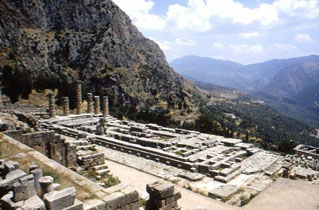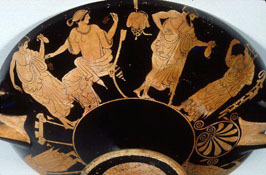
Introduction to Greek Literature

Temple of Apollo, Delphi
Instructor: John Gruber-Miller, 312 College Hall; Office: x4326; email: grubermiller
Class meetings: M W F 8:30-10 a.m. and 10:30-12 noon; T Th 9-11 a.m. and 1-3 p.m.
Office Hours: M W F 1-2 p.m. and always by appointment.
Required Materials
- Maurice Balme and Gilbert Lawall, Athenaze: An Introduction to Ancient Greek, Vol. II, Oxford University Press, 1990.
- Gramma: Software to accompany Athenaze (drills vocabulary and forms)
- 3-ring binder for homework, notes, and paradigms (it is best not to do homework in textbook).
- One high-quality blank cassette (for taped readings).
Objectives
The main goal of the course is to improve your ability to communicate, both in Greek and in English, to become sensitive to the nuances of language. More specifically, you will learn:- Grammar: the passive voice, indirect statement, the optative mood, the perfect and pluperfect tenses, and conditional statements.
- Vocabulary: build on basic vocab, learn to recognize compounds, cognates, words in context.
- Culture: understand how the major events of the last half of the 5th c. B.C., esp. the Peloponnesian War, influenced Greek culture and literature.
- Reading: be introduced to a variety of Greek authors.
Preparation for class
Since several weeks have intervened since 102, you will undoubtedly feel rusty. Be assured that your knowledge of Greek will come back. Don't feel that you need to review everything all at once. Steady, daily, systematic review is the best way to insure recall of old material and mastery of new. Therefore, every day spend time reviewing vocabulary and grammar. Second, spend time reading connected prose, re-reading it, listening to the tapes. Third, practice by composing sentences that use new vocabulary, new sentence patterns, new grammar, and by doing Gramma exercises and other homework. If you are an active learner, using all your senses and motor skills, you will learn Greek much more easily, and best of all you will retain it!Gramma exercises
Gramma is available on all public-access Macs on campus. Gramma runs only on Mac's, not PCs. If you own your own Mac, I will make you a copy of the exercises. Gramma consists of three HyperCard stacks that allow you to review vocabulary (Mnemonika); nouns, adjectives, and pronouns (Onomata); and verbs (Rhemata). The advantage of using Gramma to practice vocabulary and paradigms is that you will learn immediately whether your answer is right or wrong. Gramma lets you work at your own pace. It doesn't mind how long you take to answer or how many times you do an exercise. It is best, however, not to try Gramma until after you have studied the grammar in your textbook first.Taped reading/story writing
Several times this term I will ask you to put either your oral or written skills into practice. The projects may be collaborative efforts. Oral reading should attempt to catch the meaning of the Greek through your pace, intonation, and phrasing. The story writing will be successful if it is comprehensible (e.g. is the grammar reasonably correct) and coherent (does the story flow from one paragraph to the next, use the proper transitional words, etc.).Commentary
There will be two further projects, besides tests, that will help you appreciate ancient Athens and the Greek language: a commentary on a passage (30-40 lines long), demonstrating your knowledge of the general background, the genre, meter (if poetry), grammar, allusions, and cultural context of the passage. In the process you will become familiar with a particular author's works and style since you will need to read through some of his works in order to find the appropriate passage.Symposion Project
The second project is a creative project that you will present at our final symposion. It may be artistic, musical, poetic, dramatic, satiric, philosophic. It may be from the Greek world or may take the Greek world as its inspiration. More on this later.

Kylix (Side A), Toledo Museum of Art
Grading:
- frequent quizzes (1 of which can be dropped) 20%
- taped reading/story writing 10%
- Commentary 20%
- symposion project 10%
- midterm 20%
- final exam (comprehensive) 20%
| A 93-100 | B+ 87-89 | C+ 77-79 | D+ 67-69 | F below 60 |
| A- 90-92 | B 83-86 | C 73-76 | D 63-66 | |
| B- 80-82 | C- 70-72 | D- 60-62 |
Final Note: Do not get behind at any time. Ask for help before you
feel you are slipping.
Return to Cornell College Classical Studies Home Page
Last Update: 29
July 1999
Site Maintainer:
classical_studies@cornellcollege.edu